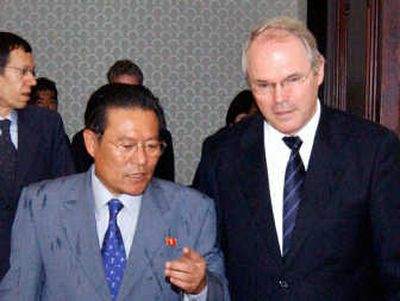U.S. envoy visits N. Korea

WASHINGTON – Assistant Secretary of State Christopher Hill launched a surprise two-day trip to Pyongyang on Thursday, becoming the highest-ranking U.S. official to travel there since the crisis over North Korea’s nuclear ambitions began nearly five years ago.
Hill visited the North Korean capital at the sudden request of the country’s government and – in a shift in policy – the United States did not demand any concessions as a condition for the trip. Hill had long lobbied to travel to Pyongyang, but Secretary of State Condoleezza Rice and other top officials had insisted that North Korea had to earn such a high-profile gesture by first shutting down its nuclear reactor.
But the aging reactor at Yongbyon is still operational, and this week the United States also arranged for North Korea to receive millions of dollars that the U.S. Treasury Department had previously deemed the fruits of illicit activities.
The Bush administration – which once all but barred bilateral contacts between North Korean and U.S. diplomats – has sought to portray such shifts in policy as part of a natural evolution. But former administration officials who had once fought internal battles over North Korea policy said Thursday the administration appears to be weakening its negotiating position by making so many concessions so quickly.
“Meeting and engaging with North Korea bilaterally is appropriate,” said Michael Green, who was the top Asia specialist at the White House in 2005 and is now at the Center for Strategic and International Studies. “But the administration has to be careful about shifting goal posts. North Korea has not shut down their reactor, and they have extracted all of their demands – demands they had been told they would not get unless the reactor was shut down.”
Many of President Bush’s core conservative supporters also expressed distress over the administration’s move. “This is another mistake that will convince the North Koreans that they have the whip hand and the State Department is desperate for a deal,” said John Bolton, former U.S. ambassador to the United Nations.
State Department spokesman Sean McCormack rejected notions that the administration has changed direction. “There are always accusations of, ‘Well, you know, the administration has come unmoored from its principles and its policies, and it’s shifting policies,’ ” he told reporters. “I would submit to you that this is not a change in policy.”